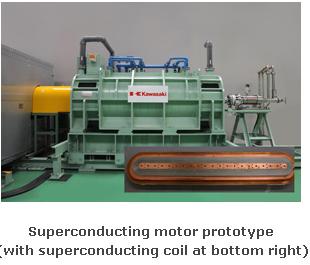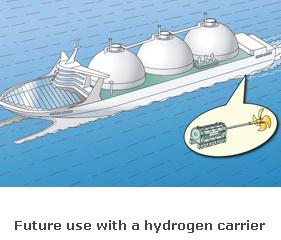Kawasaki Heavy Industries, Ltd. announced in Nov, 2010 that its prototype superconducting motor has broken a new record. The motor achieved Japan’s highest power output of 450 kW in a test conducted at Kawasaki’s Akashi Technical Institute in Akashi, Hyogo Prefecture. This achievement marks yet another breakthrough in Kawasaki’s research and development into space and energy-saving superconducting motors for large vessel propulsion systems as well as large-scale industrial drive systems.
A vessel employing an electric propulsion system with a superconducting motor will consume far less electricity than an ordinary diesel engine ship. What’s more, the motor’s compact size makes room for optimal hull designs that will reduce wave resistance. Another benefit is minimal energy loss since the motor drives the ship’s propellers directly without the use of speed reducers. Altogether these advantages of superconducting technology cut fuel consumption by about 20%.
In 2010, Kawasaki began development of a 3 MW commercial model for use with various types of domestic cargo vessels that will boast the world’s highest efficiency and smallest footprint. Kawasaki is moving full speed ahead to put superconducting motors to use on medium and large-sized merchant ships as well as industrial power generators and drive systems for highly efficient products designed to shrink our carbon footprint. Superconducting motors for liquefied natural gas carriers as well as tomorrow’s liquefied hydrogen carriers are making the most of cold energy to bring propulsion system efficiency to new heights.
If you liked this article, please give it a quick review on ycombinator or StumbleUpon. Thanks

Brian Wang is a Futurist Thought Leader and a popular Science blogger with 1 million readers per month. His blog Nextbigfuture.com is ranked #1 Science News Blog. It covers many disruptive technology and trends including Space, Robotics, Artificial Intelligence, Medicine, Anti-aging Biotechnology, and Nanotechnology.
Known for identifying cutting edge technologies, he is currently a Co-Founder of a startup and fundraiser for high potential early-stage companies. He is the Head of Research for Allocations for deep technology investments and an Angel Investor at Space Angels.
A frequent speaker at corporations, he has been a TEDx speaker, a Singularity University speaker and guest at numerous interviews for radio and podcasts. He is open to public speaking and advising engagements.



